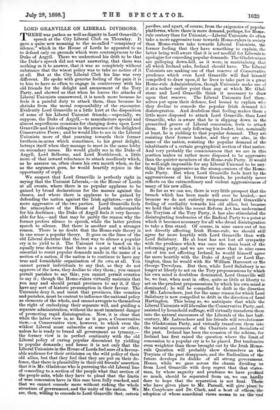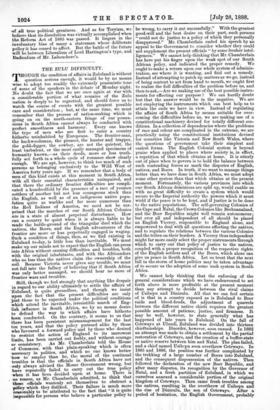LORD GRANNULTY , ON LIBERAL DIVISIONS. T HERE was pathos as well
as dignity in Lord Granville's speech at the City Liberal Club on Thursday. It gave a quite new meaning to the so-called " conspiracy of silence," which in the House of Lords he appeared to us to defend only on grounds which were contemptuous to the Duke of Argyll. There we understood his drift to be that the Duke's speech did not want answering, that there was nothing in it to answer, that it was so completely without substance that the wisest policy was to take no notice of it at all. But at the City Liberal Club his line was very different. He spoke with genuine feeling of the pain it is to him to have so often to engage in controversy with his old friends for the delight and amusement of the Tory Party, and showed us that when he leaves the attacks of Liberal Unionists unanswered, it is much more because he feels it a painful duty to attack them, than because he shrinks from the moral responsibility of the encounter. Evidently Lord Granville is a little hurt at the disposition of some of his Liberal Unionist friends,—especially, we suppose, the Duke of Argyll,—to manufacture special and almost superfluous occasions for charging down upon Lord Granville and his colleagues in the presence of the delighted Conservative Peers ; and he would like to see in the Liberal Unionists more of that yearning towards their former brothers-in-arms which sometimes, to his great delight, betrays itself when they manage to meet in the same lobby on secondary issues. He would gladly see in the Duke of Argyll, Lord Selborne, and Lord Northbrook, a little more of that inward reluctance to attack needlessly which, as he assures us, often closes his own mouth when, so far as the argument goes, he would heartily rejoice in the opportunity of reply.
We suspect that Lord Granville is perfectly right in saying that the Unionist Liberals,—in the House of Lords at all events, where there is no popular applause to be gained by broad declarations for the masses against the classes, and where there is applause to be gained by defending the nation against the Irish agitators,—are the more aggressive of the two parties. Lord Granville feels the atmosphere of the House of Lords unfavourable for his doctrines ; the Duke of Argyll feels it very favour- able for his,—and that may be partly the reason why the former prefers silence to speech, while the latter prefers speech to silence. But there is another and a stronger reason. There is no doubt that the Home-rule theory is in one sense a popular theory. It goes on the lines of the old Liberal doctrine that the best way to silence a popular cry is to yield to it. The Unionist view is based on the equally true doctrine that there is a point at which it is essential to resist popular demands made in the name of a section of a nation, if the nation is to continue to have any true and formidable organisation of its own at all. You cannot permit individuals to say that, as they do not approve of the laws, they decline to obey them ; you cannot permit parishes to say this ; you cannot permit counties to say it ; though the Home-rulers virtually maintain that you may and should permit provinces to say it, if they have any sort of historic presumption in their favour. The Unionists deny it, and insist that provinces, like counties and parishes, must be content to influence the national policy as elements of the whole, and cannot arrogate to themselves the right of embodying their separate will, and guiding a separate administration, without the most imminent danger of promoting rapid disintegration. Now, it is clear that while the latter view is, so far as it goes, a Conservative view,—a Conservative view, however, to which even the wildest Liberal must subscribe at some point or other, unless he is ready to brand all government as tyranny,— the former view is in perfect continuity with the old Liberal policy of curing popular discontent by yielding to popular demands ; and hence it is not only that the Liberal Unionists in the House of Lords feel sure of a favour- able audience for their criticisms on the wild policy of their old allies, but that they feel that they are put on their de- fence, that there is plausibility in their old friends' assertion that it is Mr. Gladstone who is pursuing the old Liberal line of conceding to a section of the people what that section of the people asks, while they have to plead that the limits of wise concession have in this case been fully reached, and that we cannot concede more without risking the whole structure of government, and the unity of the nation. We are, then, willing to concede to Lord Granville that, cceteris paribus, and apart, of course, from the exigencies of popular platforms, where there is more demand, perhaps, for Home- rule oratory than for Unionist,—Liberal Unionists do often take a more aggressive tone inwards Home-rulers in society than Home-rulers take towards Liberal Unionists, the former feeling that they have something to explain, the latter being well aware that it is not needful for Liberals to apologise for conceding popular demands. The Gladstonians are galloping down-hill, as it were, in maintaining that all which Ireland asks, Ireland should have. The Liberal Unionists are making use of that reserve of Conservative prudence which even Lord Granville will find himself compelled to draw upon, if he lives to take part in a great Home-rule Administration, though Unionists make use of it at a rather earlier point than any at which Mr. Glad- stone and Lord Granville think it necessary to draw upon that reserve. The Liberal Unionists feel them- selves put upon their defence, feel bound to explain why they decline to concede the popular Irish demand for disintegration. And doubtless that feeling makes them a little more disposed to attack Lord Granville, than Lord Granville, who is aware that he is slipping down in the prescribed groove of Liberal concession, feels to attack them. He is not only following his leader, but, nominally at least, he is yielding to that popular demand. They are resisting their former leader, and they are also, in the name of the nation, resisting the popular demand of the inhabitants of a certain geographical section of that nation. And very probably the consciousness that we are in this position makes us rather more disposed to be aggressive than the quieter members of the Home-rule Party. It would be well-nigh impossible for any Liberal Unionist to be any- thing like so aggressive as the stump-orators of the Home- rule Party. But when Lord Granville feels hurt by the aggressiveness of his former friends, he probably never reflects on the extraordinary and violent aggressiveness of many of his new allies.
So fax as we can see, there is very little prospect that the breach which has been made will ever be healed,—not because we do not entirely reciprocate Lord Granville's feeling of cordiality towards his old allies, but because we hold that while the recent Reform Act has undermined the Toryism of the Tory Party, it has also stimulated the disintegrating tendencies of the Radical Party to a point at which it becomes necessary for all who dread disintegration to take a firm stand. Of course, in nine cases out of ten not directly affecting Irish Home-rule, we should still agree far more heartily with Lord Granville than with Lord Salisbury. He at least has not lost all sympathy with the prudence which was once the main boast of the reforming party, and we are very sure that in nine cases out of ten not affecting Ireland, he would himself agree fax more heartily with the Duke of Argyll or Lord Har- tington, than he would with Sir William Harcourt or Sir George Trevelyan. But then, while Lord Salisbury is no longer at liberty to act on the Tory prepossessions by which his own mind is doubtless dominated, Lord Granville will be, we fear, when next in office, quite as little at liberty .to act on the prudent prepossessions by which his own mind is dominated ; he will be compelled to drift in the direction of Mr. Labouchere, just for the same reason for which Lord Salisbury is now compelled to drift in the direction of Lord Hartington. This being so, we anticipate that while the Liberal Unionists will liberalise the Conservative Party, and, assisted by household suffrage, will virtually transform them into the natural successors of the Liberals of the last half- century, Mr. Labouchere and his friends will revolutionise the Gladstonian Party, and virtually transform them into the natural successors of the Chartists and Socialists of the past. Ireland has been the occasion of the schism, for Ireland has first raised the question where the limit of concession to a popular cry is to be placed. But tendencies even weightier than those brought out by the Irish Home- rule Question will probably show themselves as the Toryism of the past disappears, and the Radicalism of the future develops its dislike of all strong government. Hence, while we gaze across the chasm dividing us from Lord Granville with deep regret that that states- man, by whose sagacity and prudence we have profited so much, should be separated from us, we can hardly dare to hope that the separation is not final. Thoipe who have given place to Mr. Parnell, will give plane; !to Mr. Conybeare and Dr. Clark, and a host of othert;'the adoption of whose anarchical views seems to us the-eid of all true political greatness. And as for Toryism, we believe that its dissolution was virtually accomplished when the. Reform Act of 1885 was passed. It lingers in the involuntary bias of many a statesman whose deliberate policy it has ceased to affect. But the battle of the future will be between Liberalism of Lord Hartington's type, and Radicalism of Mr. Labouchere's.



































 Previous page
Previous page